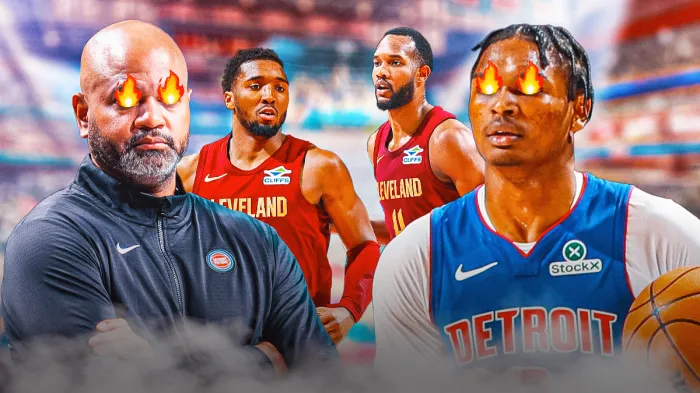With a 12-game winning run over the Detroit Pistons acting as their safety net, Donovan Mitchell and the Cleveland Cavaliers arrived to Little Caesars Arena with history on their side. However, history didn’t matter to the Cavaliers in this specific game. What transpired served as a sobering lesson that success in the present is not always guaranteed by past dominance.
The Cavaliers lost 133-122 in a game that revealed their growing weaknesses as the season draws to a close, despite a late comeback led by heroics from Donovan Mitchell in the fourth quarter. Mitchell scored 38 points, including 22 in the last quarter, but it wasn’t enough to save Cleveland from a night full of defensive mistakes, turnovers, and rebounding problems.
The Pistons appeared to be the more hungry squad right away because they were without their franchise mainstay, Cade Cunningham. They were relentless, disciplined, and physical. In contrast, the Cavaliers were lethargic, uncoordinated, and unprepared to set the pace. Kenny Atkinson, the head coach, was candid in his assessment of the loss.
Atkinson remarked, “We were kind of on our heels.” The strategy was to remove the paint. Reduce the number of turnovers. Win the game of rebounds. You either follow the directions or you don’t. We didn’t. Their will was enforced. Their identity was forced. You come out with the L because of this.
This wasn’t just another loss, it could be a warning sign for the Cavs
It was more than just another defeat. This was a red flag. The Cavaliers have been enduring a difficult March schedule, as their cohesiveness has been gradually undermined by injuries, constant travel, and a lack of real practice time. They are struggling for consistency after going so long without playing back-to-back games in the same city since late February.
That instability was evident. Detroit’s aggressive approach supported their third-best defensive rating in the NBA over the previous 15 games going into the matchup. From the first tip, they overwhelmed Cleveland’s ball handlers, obstructing passing lanes and pushing full court. The Cavaliers committed 15 turnovers, many of which gave Detroit transition baskets. Taking advantage of their errors, the Pistons outscored Cleveland 25–5 in fast-break points.
Regarding reducing their turnovers, Darius Garland stated, “It’s going to be huge, especially coming down the stretch right into the playoffs because possessions matter so much.” “Just attending to the ball.” Put me in that position. Simply attend to the ball. Simply make an effort to read correctly. It will be crucial for us to slow down a bit and try to read [the game] rather than driving too fast.
Rebounding plagued Cleveland once again
The problem of turnover was exacerbated by a well-known weakness: rebounding. The Cavaliers, who finished 25th in March’s defensive rebound percentage, have had trouble controlling the glass all season. That shortcoming was exacerbated against a youthful, aggressive Pistons team. Cleveland’s attempts to gain momentum were consistently thwarted by Detroit’s backbreaking plays, which resulted in 24 second-chance points and 16 offensive rebounds.
“It’s probably the worst outcome when you hand it over to the other team,” Atkinson stated. They typically have an advantage since they exit during a transition. They are unstoppable. It felt to me like a layup drill after we turned it over.
“I believe that turnovers are a significant issue. Much of it was due to their exercise and physicality. But that’s basketball in the playoffs. All year long, we’ve done a great job of not turning it over. However, we haven’t been recently. You lose the possession game as a result. The turnover game is lost. You then lose the game of rebounding. In this league, winning is difficult.
READ MORE ON:https://sportip.co.uk/
